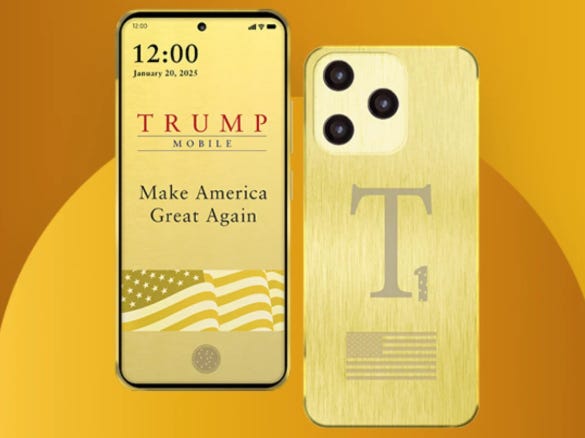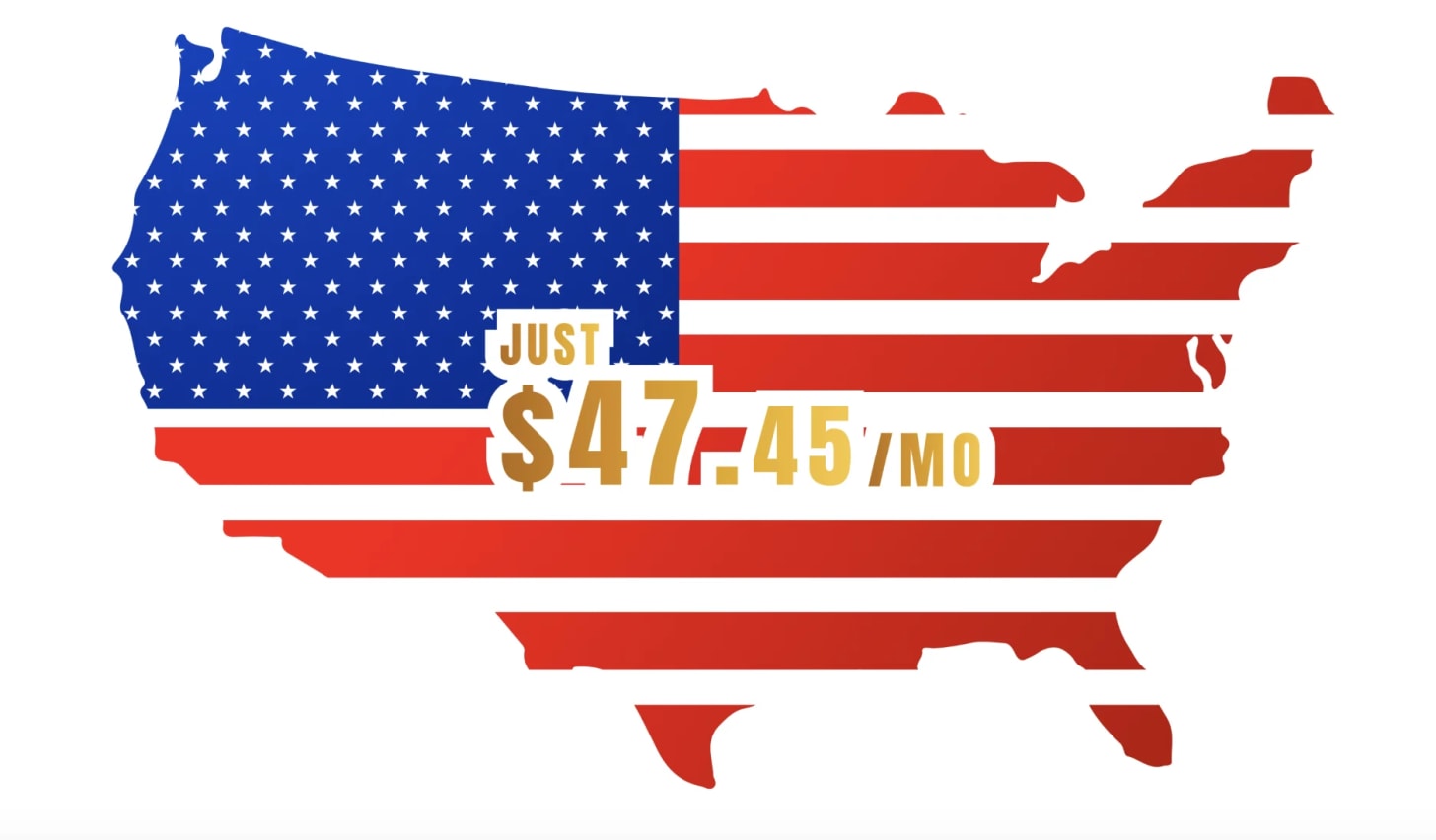Trump Phone Unveiled: Innovation or Intrusion?
A $499 gold-plated phone. A $47 monthly plan. A $100 deposit. But who's really in charge...and what are you actually buying? Would you trust it?
Written by Rebel Capitalist AI. Supervision and Topic Selection by George Gammon
Today’s big announcement from the Trump Organization has sparked a fresh round of debate among free market advocates and privacy defenders alike.
The unveiling of a new smartphone and cellular service…Trump Phone and Trump Mobile…brings with it not only bold claims but serious questions about transparency, feasibility, and the ethics of regulatory overlap.
Let’s dig into the details and unpack what this new venture really means.
The Launch: Made in America, Sold on Patriotism
The Trump Phone is being pitched as a $499 smartphone manufactured and assembled entirely in the United States.
Alongside it is Trump Mobile, a wireless plan priced at $47.45 per month, offering customer service based in the U.S. The phone, emblazoned with a gold finish and MAGA branding, is available now for pre-order with a $100 deposit.
Sounds great on paper. But does it add up?
The idea of producing every component domestically, from screens to batteries, and assembling the phone in American facilities seems almost too ambitious.
There’s a reason companies like Apple outsource their manufacturing…it’s extremely expensive and requires specialized labor and infrastructure.
According to the Trump Organization, initial manufacturing will take place in Alabama, California, and Florida.
But even Eric Trump acknowledged that the first phones will likely be built overseas.
If that’s the case, what are early customers really buying? A rebranded foreign device? And what happened to the promise of Made in the USA?
And if that promise breaks before the first shipment lands, the real product isn’t a phone at all…it’s trust, sold in advance and paid for in political capital.
But that’s only the beginning of the story…
A Self-Funded Gamble or VC Avoidance?
Rather than being funded by venture capital or even Trump’s own capital, the enterprise is taking deposits from customers to get off the ground.
This raises serious questions. If Trump and his backers aren’t willing to fund this upfront, why should consumers take the risk?
This self-funding model echoes tactics used by Elon Musk’s early promises of full self-driving technology…long on vision, short on delivery. For $100, customers are buying into a concept with no guarantee, no product in hand, and no timeline that seems realistic.
When the sales pitch comes before the product, and the capital comes from the crowd, it’s not just a startup…it’s a loyalty test.
And the next piece of the puzzle raises even more unsettling questions about who's actually pulling the strings…
Licensing and Control: Who’s Really Running the Show?
Despite the heavy branding, the Trump Organization has stated that the products and services are not designed, developed, or manufactured by Trump or his affiliates.
This suggests it’s more of a licensing deal. But if that’s the case, how can the organization ensure all the lofty claims…Made in America, superior service, patriotism-first ethos…are upheld?
The contradiction is stark. If you’re licensing the brand, you relinquish control. Yet, the message from the Trump family is that they’re delivering something transformational. How can both be true?
If Trump isn’t building it, designing it, or managing it, then who is? And more importantly…what exactly are they buying access to behind the scenes?
Privacy Concerns: From Surveillance to Slippery Slopes
Here’s where things get serious. Regardless of one’s political stance, the idea of a sitting president or major political figure owning or closely affiliated with a telecom service is a red flag.
In a conversation with libertarian legend Doug Casey, I explored this very issue. While Trump might have good intentions, the infrastructure he sets up could be exploited by future administrations. Today it’s Trump Mobile, tomorrow it could be Biden Mobile, or worse.
Data privacy is already under threat in the digital age.
A telecom company has access to call records, location data, and even health information if it's bundled with services like telehealth and pharmacy benefits.
If this company is even indirectly connected to the Oval Office, the implications are enormous.
Once telecom and politics merge, even well-meaning platforms become weapons-in-waiting. And the scariest part isn’t what happens today…it’s what happens when the wrong hands inherit the system…
Regulatory Capture: Ethics in Question
Another glaring issue is the conflict of interest. Should the regulator of an industry also be an owner or licensor in that same industry?
Let’s flip the script. Imagine Joe Biden or Hunter Biden launching a mobile service while Joe is president. Conservatives would (rightfully) cry foul.
They’d argue it’s unethical for the regulator to compete with the regulated, especially when that regulator can impose tariffs, regulations, or restrictions that give their company a competitive edge.
Now ask yourself: what’s the difference with Trump?
The argument is not about whether Trump himself would abuse power, but whether the structure enables future abuse. That’s the core of good governance…setting up systems that work regardless of who holds office.
The same people writing the rules could soon be competing on the playing field. And if that doesn’t terrify both sides of the aisle, wait until you see who’s watching from the sidelines…
The Free Market Angle: Risk vs Reward
In theory, competition is great. If Trump Mobile delivers better service at a lower price, more power to them. But that should happen on a level playing field.
When the field is tilted because one player can write the rules, the free market loses.
If tariffs are selectively applied or regulations are eased for one carrier but not others, it’s no longer competition…it’s cronyism.
In capitalism, unfair advantage is just another name for soft corruption.
And when patriotism becomes a pricing strategy, the invisible hand starts to look an awful lot like a clenched fist…
Public Response and Political Theater
So far, the announcement has sparked both enthusiasm and skepticism. Some see this as a patriotic move, bringing manufacturing and service jobs back to the U.S. Others, including many critics on the left, argue it’s a cash grab dressed in red, white, and blue.
Interestingly, some media outlets noted that Democrats were quick to criticize the initiative. But criticism, in this case, isn’t about partisan politics…it’s about precedent.
If you’re okay with Trump Mobile now, you should also be okay with Biden Mobile, or Gavin Newsom Mobile, or even AOC Mobile.
Are we ready to go there?
What if this isn’t really about phones at all? What if it’s a new kind of campaign infrastructure…one built not on votes, but on monthly recurring revenue?
Looking Ahead: What’s the Real Endgame?
At best, this is a bold branding venture with a shot at disrupting the telecom industry. At worst, it’s a potential Trojan horse for political and regulatory overreach. The truth is probably somewhere in between.
But if this device is just a rebranded, white-labeled phone from China, then it’s more Trumpcoin than iPhone…a marketing gimmick built on tribal loyalty rather than actual innovation.
As consumers and citizens, we have to think beyond the branding. What are the trade-offs? What systems are we enabling? What message are we sending when we reward power plays like this with our dollars?
The gold-plated casing might gleam, but the wiring underneath tells a different story…one that hints at a future far more centralized, politicized, and dangerous than anyone’s ready to admit…
Final Thoughts
Innovation should be celebrated, but not at the cost of ethics, transparency, or market fairness. The Trump Phone may be flashy, but the real questions are underneath the gold plating.
This story isn’t about red vs. blue…it’s about free market capitalism vs. political favoritism. And if we lose sight of that distinction, we’re not just buying a phone.
We’re buying into a future where political power and corporate control are indistinguishable.
The Trump Phone story is just one example of how political power is bleeding into private markets…and no one’s breaking it down quite like we are.
This Friday, George Gammon is likely hosting his first live Q&A exclusively for paid subscribers. We’re still awaiting his confirmation…
It’s your chance to ask questions, get real-time macro insight, and hear George’s unfiltered take on what’s really happening behind the headlines, right here on substack.
Plus, we’re releasing a subscriber-only explainer video on how Quantitative Easing actually works…not the textbook version, but the real mechanics they never teach you in school.
If you want to understand how money is really created, and how it’s quietly reshaping the world around you, this video is essential.
Also, if you are already an active Rebel Capitalist Pro subscriber, we’ll add these videos to the Rebel Capitalist Pro forum.
Join the thousands of liberty-minded investors who already trust George’s Rebel Capitalist News Desk for macro insight you won’t find anywhere else.
👉 Upgrade to paid now (its affordable) and get immediate access to all upcoming Q&As, George’s private video briefings, and everything else we don’t publish publicly.
Rebel Capitalist AI
Supervision and Topic Selection by George Gammon
June 16, 2025







